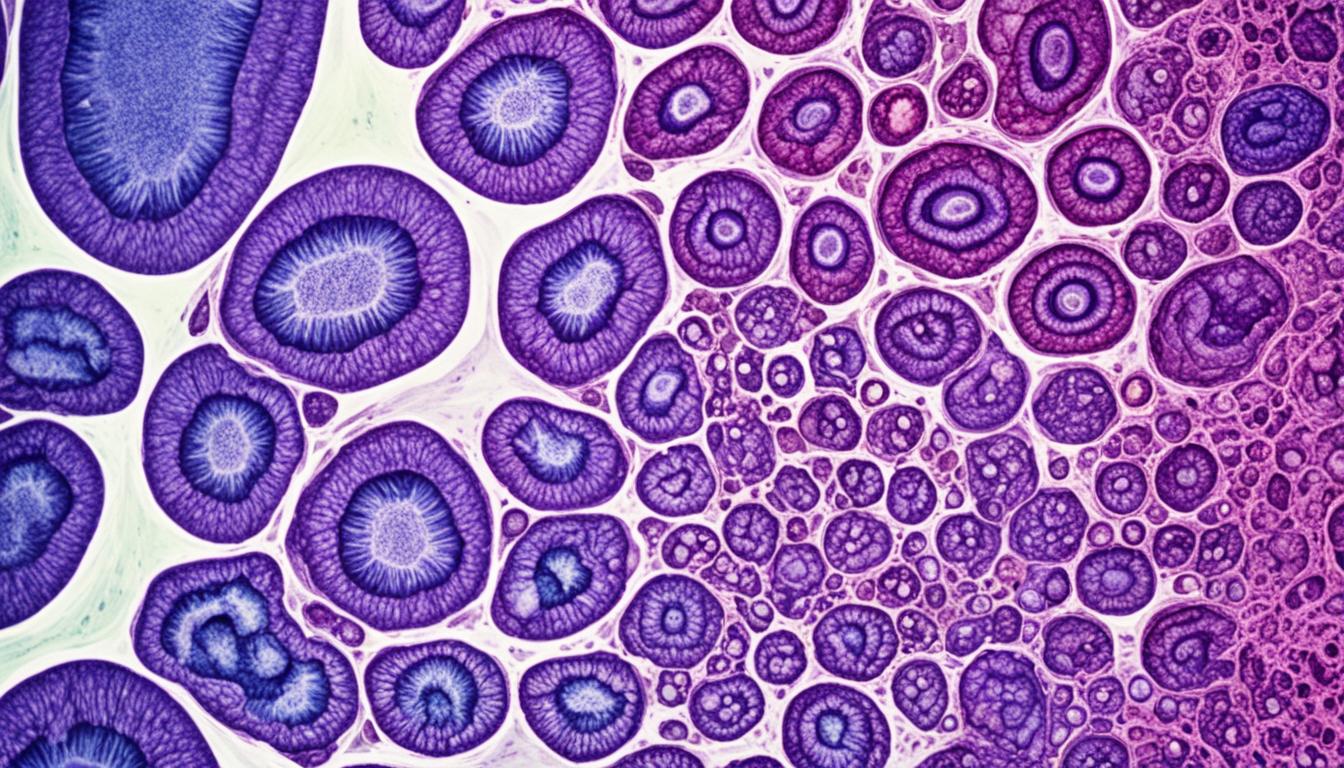Colon cancer is a serious health issue known worldwide. It’s the second most common cancer killer. This cancer mainly affects the colon, anus, or rectum. The International Agency for Research on Cancer (IARC) says colorectal cancer cases will go up in the future.
Risk factors for getting colon cancer include family history, certain genetic changes, and some health conditions. Lifestyle choices also matter, like being very overweight, smoking, and drinking too much alcohol. Finding colon cancer early is very important. Tests like colonoscopy, checking your stool, and a fecal immunochemical test help catch it soon.
Today, stem cell therapy is showing promise as a new way to treat colon cancer. It aims to offer treatments that are made just for you.
Key Takeaways:
- Colon cancer affects the colon, anus, or rectum and is a major health concern.
- Having certain risks increases your chances, including a family history and unhealthy habits.
- Doctors use tests like colonoscopy and stool checks to diagnose it early.
- Stem cell therapy might be a new, more focused treatment option.
- Early diagnosis is key in fighting colon cancer and improving your chances.
Risk Factors for CRC Development
Several things can raise the risk of getting colon cancer. Knowing these risks helps spot people at higher chances. This lets us take steps to prevent colon cancer.
Family History of Colon Cancer
If someone’s parents or siblings had colon cancer, they might too. They could inherit genes that make colon cancer more likely for them. This is a big reason family history matters.
Genetic Mutations
Some people are born with gene changes that make colon cancer more likely. Lynch syndrome is one example. It’s a genetic issue that can push cancer to start earlier in life.
Lifestyle Factors
Being obese can contribute to colon cancer. Extra fat can lead to inflammation and hormonal changes that might spark cancer. Smoking and drinking too much also up the risk.
Other Risk Factors
Inflammatory bowel diseases can make colon cancer more likely. As people get older, the risk goes up too. Some places have more colon cancer, suggesting the environment plays a role as well.
Knowing about colon cancer risks is key to catching it early or preventing it. People at higher risk can get special checks and advice on lifestyle changes. This can lower their cancer risk.
| Risk Factors | Description |
|---|---|
| Family History of Colon Cancer | A history of colon cancer in close relatives increases the risk. |
| Genetic Mutations | Certain genetic disorders increase the likelihood of colon cancer. |
| Lifestyle Factors | Obesity, smoking, and excessive alcohol consumption are linked to an elevated risk. |
| Inflammatory Bowel Disease | Conditions like ulcerative colitis and Crohn’s disease increase the risk. |
| Age | The risk of colon cancer increases with advancing age. |
| Geographic Regions | Certain areas have higher incidence rates of colon cancer. |
Developmental Stages of CRC
Colon cancer grows in different stages that show how far the tumor has spread. The TNM system helps doctors categorize it from stage 0 to IV. This method guides diagnosis and treatment decisions.
At stage 0, the cancer is new and only affects the colon’s inner layer. In stages I and II, the tumor grows more but stays in the colon. It hasn’t reached the nearby lymph nodes yet.
Stage III is when cancer cells start spreading to nearby lymph nodes. This means the cancer is more serious. Doctors need to choose treatment carefully here. Stage IV is the most advanced, with cancer spreading to distant parts like the liver or lungs. Treating stage IV is very challenging.
Doctors also look at the tumor’s grade, which shows how fast it’s growing. By combining the stage and grade, they can tailor treatments. This approach helps improve the patient’s chances of beating the cancer.
FAQ
Q: What are the common symptoms of colon cancer?
A: Symptoms of colon cancer include blood in the stool and unexplained weight loss. You might also notice changes in how your bowel moves. This could be either diarrhea or constipation, or you might feel abdominal pain or cramps. Fatigue is another common sign.
Q: What are the main causes of colon cancer?
A: The main causes of colon cancer are genetic mutations and family history. Other risk factors are inflammatory bowel disease and certain lifestyle choices like being obese, smoking, and drinking too much alcohol.
Q: How is colon cancer diagnosed?
A: Doctors can diagnose colon cancer in different ways, such as using a colonoscopy. This test checks your colon for any issues. They also use stool and fecal tests to find blood or abnormal cells in your stool.
Q: What is stem cell therapy for colon cancer?
A: Stem cell therapy is a new way to treat colon cancer. It uses stem cells to give people personalized treatment. These cells can become different kinds of cells. This is helpful because it can send treatments right to the cancer site.
Q: What are the risk factors for colon cancer?
A: Risk factors for colon cancer include a family history and genetic mutations. Lifestyle also plays a role, such as being obese, smoking, and drinking too much. Age and living in certain places can also increase the risk.
Q: What are the stages of colon cancer?
A: Doctors put colon cancer into different stages, from 0 to IV. Stage 0 means it’s just starting, while stage IV means it has spread to other parts of the body. Stages I and II see the cancer grow past the colon’s inner layers. Stage III means it’s spread to the lymph nodes nearby.

